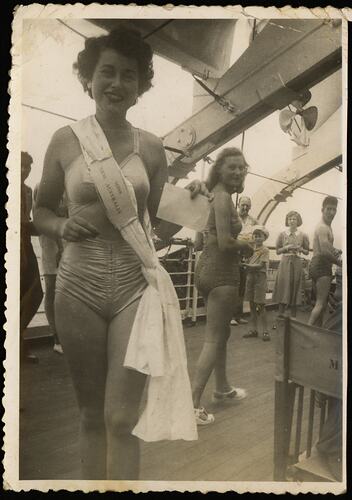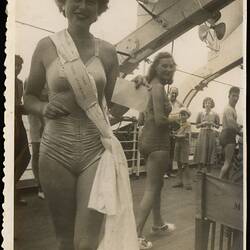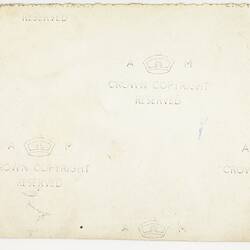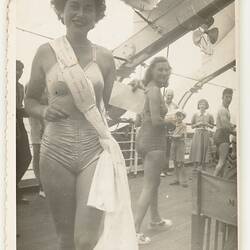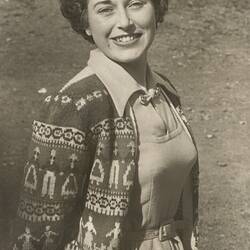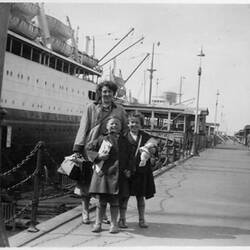Summary
Photograph of Bernice Kopple deckside onboard the ship New Australia after winning the Miss New Australia beauty competition during her migrant voyage from Scotland to Australia, December 1950. The 'Miss New Australia' sign pinned to her sash is also in the Museum's collection.
Bernice Kopple was born in Glasgow, Scotland in 1930 and migrated to Melbourne onboard the ship New Australia in 1950. She was nineteen years old and travelled alone, her mother and three siblings following later. Bernice was crowned Miss New Australia during the voyage, and went on to be Miss Torquay at the Sun Beach girl contest in 1951. Throughout the 1950s and 1960s Bernice worked as a model, entertainer, showgirl, snake dancer and animal handler on entertainment circuits around Australia and New Zealand. She pursued her passion for animals as a keeper at the Melbourne Zoo, lecturing on wildlife in schools and on television and developing her snake act in theatres, clubs, tent shows and drive-in cinemas.
In the 1970s, Bernice moved from Melbourne to Adelaide and worked as a mature model for daywear, bikinis and lingerie.. She toured Australia with her dog and caravan, cultivating her reputation as a modern, independent woman, mustering, cooking and jillarooing in the Northern Territory and becoming manager at the Cairns Oceanarium. During the 1980s and 1990s, Bernice continued with modelling work and animal care in Adelaide until 2002, and she died in 2011. Bernice was well known for her energy, beauty, and wit and also remained proud of her Scottish heritage.
Description of Content
Woman in one piece bathing suit with white sash onboard a ship.
Physical Description
Black and white photograph
Significance
Statement of Historical Significance:
Bernice Kopple's story enables the exploration of a number of key social historical themes including migration, gender, popular culture and identity. Hers is a more unconvential angle on the traditional migrant story. She both perpetuates and challenges traditional female gender roles and this is being conducted at a critical time in the history of the women's movement. She is an independant woman confident in her own sexuality but her public personna and work can also be seen as contributing to female sterotypes as sexualised beings. Her story takes place in urban and rural environments, in the public and private domain.
More Information
-
Collecting Areas
Migration & Cultural Diversity, Leisure, Images & Image Making, Transport
-
Acquisition Information
Donation from Rachel Legge, 07 Apr 2014
-
Person Depicted
-
Format
Photograph, Black & White
-
Classification
-
Category
-
Discipline
-
Type of item
-
Keywords
Scottish Immigration, Assisted Immigration, Entertainers, Entertainment Industry, Animals, Animal Shows, Snakes, British Immigration, Performers, Swimming, Fashion Models, Shipping Lines
